#Alice Duer Miller
Text

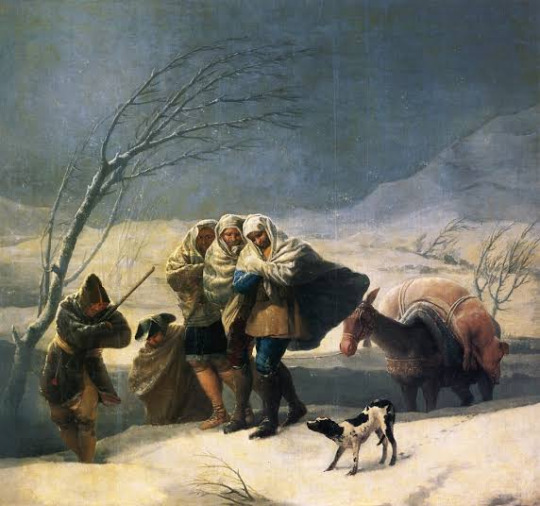









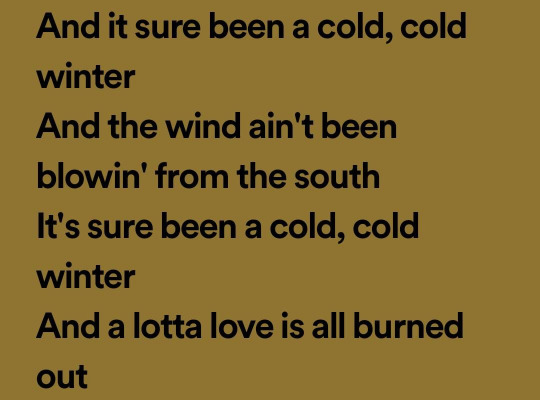



The White Cliffs, by Alice Duer Miller // The Snowstorm, by Francisco Goya // The Raven, by Edgar Allan Poe // Goldenrod in December, by Charles Ephraim Burchfield // The Chinese Nightingale, by Vachel Lindsay // Returning Home in a Winter Woodland, by Moras Walter // Zinaida Gippius // The Train in the Snow, by Claude Monet // Sonnet 97, by William Shakespeare // Landscape with Snow, by Vincent Van Gogh // A Teaspoon of Stars, by Chandrama Deshmukh // Winter, by The Rolling Stones // The Magpie, by Claude Monet // How Did It Get So Late So Soon? by Dr. Seuss // Screaming Through December, by Hall and Oats
#web weaving#december#the white cliffs#alice duer miller#the snowstorm#francisco goya#the raven#edgar allan poe#goldenrod in december#charles ephraim burchfield#the chinese nightingale#vachel lindsay#returning home in a winter woodland#moras walter#zinaida gippius#the train in the snow#claude monet#sonnet 97#shakespeare#landscape with snow#vincent van gogh#a teaspoon of stars#chandrama deshmukh#winter#the rolling stones#the magpie#how did it get so late so soon#dr seuss#quotes#art
25 notes
·
View notes
Text
This morning I find myself idly contemplating using the question "who is your favorite poet?" as an icebreaker. If you clarified that song lyrics absolutely count, I think it could tell you some really interesting things about a crowd of strangers.
6 notes
·
View notes
Text
Alice Duer Miller: Contempt
English: Alice Duer Miller (1874-1942) (Photo credit: Wikipedia)
“Contempt is the weapon of the weak and a defense against one’s own despised and unwanted feelings. ”
–—Alice Duer Miller.
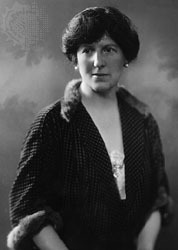
View On WordPress
1 note
·
View note
Text
I saw a lady on the stair,
And she was, oh, so strangely fair,
With a knot of butter-colored hair,
And a waiting, listening, wondering air.
She was tall as a lady ought to be,
And down she looked and smiled at me.
Her eyes were queerly brightly blue
As the bit of sky that last shines through
The gathering clouds, oppressive, gray,
On a chilly windy Autumn day.
There she paused on the stairs and smiled
Like a child who sees another child
With whom it would dearly like to play
If it only could get its nurse away.
And I know not what divine surmise
Leapt up like fire in my eyes,
But I know her smiling suddenly stopped,
And a curtain between us blankly dropped,
And she passed me by as if I were
A man invisible to her.
The History of a Minute by Alice Duer Miller
0 notes
Text
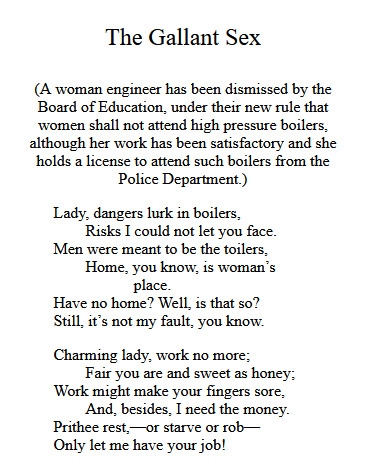
Are Women People? A Book of Rhymes for Suffrage Times is the title of the collection of satirical poems published on June 12, 1915 by suffragist Alice Duer Miller. Many of the poems in this collection were originally released individually in the New York Tribune between February 4, 1913 to November 4, 1917.
#feminism#Are women people?#Alice Miller#Alice Duer Miller#women's suffrage#1915#poems#satire#political satire#gender equality#patriarchy
0 notes
Text
Let me not to the marriage of true minds....
No, this is not marriage, this poem talks about labour. Give it a read.
0 notes
Text
Thought of the Day
“Listening is not merely not talking, though even that is beyond most of our powers; it means taking a vigorous, human interest in what is being told us. You can listen like a blank wall or like a splendid auditorium where every sound comes back fuller and richer.”—Alice Duer Miller
2 notes
·
View notes
Photo

Ginger Rogers and Fred Astaire in Roberta (William A. Seiter, 1935)
Cast: Irene Dunne, Fred Astaire, Ginger Rogers, Randolph Scott, Helen Westley, Claire Dodd, Victor Varconi, Luis Alberni, Ferdinand Munier, Torben Meyer, Adrian Rosley, Bodil Rosing. Screenplay: Jane Murfin, Sam Mintz, Allan Scott, Glenn Tryon, based on a play by Otto A. Harbach and a novel by Alice Duer Miller. Cinematography: Edward Cronjager. Art direction: Van Nest Polglase, Carroll Clark. Film editing: William Hamilton. Music: Jerome Kern, Max Steiner.
If Roberta is less well-known than most of the Fred Astaire-Ginger Rogers movies, it's partly because it was out of circulation for a long time after 1945, when MGM bought up the rights to the film and the Broadway musical on which it was based, planning to remake it in Technicolor as a vehicle for Gene Kelly and Frank Sinatra. That plan fell through, and the actual remake, Lovely to Look At (Mervyn LeRoy, 1952) with Kathryn Grayson, Howard Keel, Red Skelton, and Marge and Gower Champion, is nothing special. But MGM's hold on the property meant that, unlike the other Astaire-Rogers films, it didn't show up on television until the 1970s. But it was also a kind of throwback to the first of their movies, Flying Down to Rio (Thornton Freeland, 1933), in that they weren't the top-billed stars of Roberta, and their plot is secondary to that of the star, Irene Dunne, and her leading man, Randolph Scott. It doesn't matter much: What we remember from the film are the great Astaire-Rogers dance numbers, "I'll Be Hard to Handle," "I Won't Dance," and the reprises of "Lovely to Look At" and "Smoke Gets in Your Eyes." Scott's inability to sing resulted in the big number for his character in the Broadway version, "You're Devastating," being cut from the song score of the movie. "I Won't Dance" was brought in from another Jerome Kern musical, and Kern and Jimmy McHugh composed that fashion-show/beauty-pageant classic "Lovely to Look At," with lyrics by Dorothy Fields, for the film, earning Roberta its only Oscar nomination. Except when Astaire and Rogers are doing their magic, the film is a little draggy, and Dunne and Scott strike no sparks. Look for a blond Lucille Ball, draped in a feathery wrap, as one of the models in the fashion show.
2 notes
·
View notes
Note
Postman romanticized—really, he over-romanticized—print as a paradigm. He celebrated the literacy and erudition of the early American 19th century without paying much attention to the many, many people who were excluded from the era’s notion of politics.
And he had very little to say about the plain counterargument to Amusing Ourselves to Death, which is that entertainment, engaging people as it does, can be extremely democratic. Americans have long leveraged the power of the lol to effect political change (see the humor that pulses through Thomas Paine’s Common Sense, or, slightly more recently, the suffragette Alice Duer Miller’s 1915 book of satirical poetry, tellingly titled Are Women People?). Politically weaponized dinosaurs may be distinct creations of this supremely bizarre political moment; they are also, however, distinctly American.
I feel like this has been brought up before and all I’ll say is that I don’t think any of this undercuts or negates his argument, and I think the point he made is that entertainment has largely replaced or neutered engagement and turns people away in the first place from it.
0 notes
Photo

New-York Tribune, October 15, 1916
657 notes
·
View notes
Photo
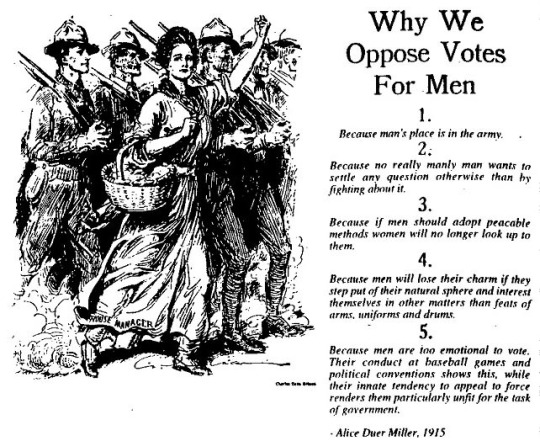
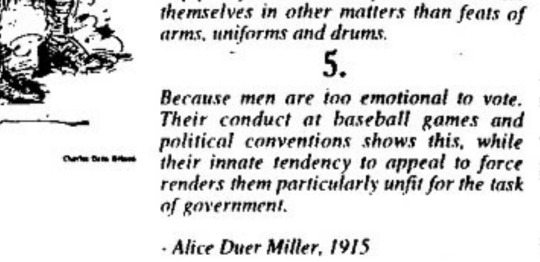
Por que los hombres no pueden tener derecho a voto.
Para hacerlo más local cambiar el baseball for el fútbol y ya está.
Un cartel de 1915. Algo de razón igual tiene Alice Duer Miller
via: @art-is-art-is-art
8 notes
·
View notes
Text
Last night I saw a city by the sea,
Outlined in sparks of fire;
Those wreathed lamps made all a fantasy—
Arch, dome and spire.
I saw above the waters pale and gray,
The pale moon stand,
I heard, but faint and sweet and far away,
A martial band.
The distant voices in the streets, the sound
Of laughter from the towers
Made where we swam the solitude profound:
The sea was ours.
Easton’s Beach by Alice Duer Miller
0 notes
Quote
Isabella had already gone upstairs and ought to have been undressing, but it happened to be the hour at which the creative instinct in regard to hats was strongest in her. Hats, which in daylight's hour appeared in hopeless ruin, had been known between ten and midnight to assume the semblance of perfection."
This is from The Blue Arch in 1910 by Alice Duer Miller, who best-remembered for her novel Gowns by Roberta from 1933 which was made into a film in 1935 with Irene Dunne, Randolph Scott, and Fred Astaire and Ginger Rogers. Isabella is the sister of the heroine of the story, Nina, a young woman who has studied astronomy who wants to work as a scientist despite the fact that the wealth of their family makes work unnecessary and the traditions of their family identify making a suitable marriage the only acceptable purpose goal for a young woman. Isabella was working on a large, lace hat which in 1910 would have been lace drawn over a covered wire frame. Such hats sat on top of large up-do hair styles and were held on with long hat pins.
For the last day of my fashion history class this year, I brought in several hats of my own making, and a student who had her hair up that day served as my model. If my students are any proof, the charm of hats persists
#Alice Duer Miller#The Blue Arch#1910 fashions#vintage hats#vintage millinery#hats#millinery#hat design#millinery design#lace hats#costume history#fashion history#dress history#vintage fashion#gowns by roberta#roberta
12 notes
·
View notes
Quote
Lovers in peace-time
with fifty years to live
have time to tease and quarrel
and question what to give;
but lovers in wartime
better understand
the fullness of living
with death close at hand.
Alice Duer Miller, from, The White Cliffs.
11 notes
·
View notes
Photo

SLYTHERIN: “The strongest will is the will that knows how to bend.” --Alice Duer Miller (Manslaughter)
298 notes
·
View notes
Photo

I am American bred,
I have seen much to hate here—much to forgive,
But in a world where England is finished and dead,
I do not wish to live.
Alice Duer Miller
15 notes
·
View notes